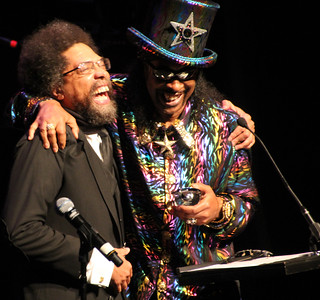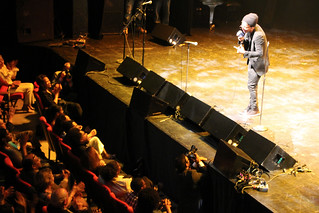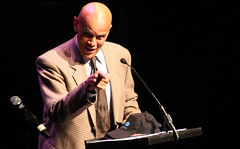A Funky Retirement: Celebrating Cornel West

Recording artist Bootsy Collins is one of many artists Cornel West has inspired.
I’ve only known retiring Princeton University professor Cornel West as a celebrity activist. I’ve never read Race Matters, his most popular book, or any of his others (though I’m off to the library momentarily with a list). I first encountered West, with no clue as to who he was, at the 2007 American Academy of Religion annual meeting in San Diego, where he and talk show host Tavis Smiley shared a stage. In what became one of the most popular articles ever published on my personal blog, I described that experience as an exciting “gospel pep rally.”
Even in the hallways at AAR, West had the air of celebrity about him. Perhaps it was his appearance in two of the Matrix films. As I passed him, he seemed to expect people to recognize and stop him. When he called out a question from the back of the room at a panel discussion of philosopher Charles Taylor’s book A Secular Age, everyone paid attention.
I began paying attention too, both when he was campaigning for presidential candidate Barack Obama in 2008 and since he’s become one of the president’s most vocal critics on the political left. Last year, I heard West speak eloquently and passionately about racism in the criminal justice system at the Princeton University Imprisonment of a Race conference with author Michelle Alexander.

Eddie Glaude, Jr. said Cornel West has been his "saving grace."
I’m aware that some Black intellectuals have a “What have you done for me lately?” attitude towards West’s academic achievements. Glenn Loury of Brown University and John McWhorter of Columbia University, for example, dissected his intellectual output in a Blogging Heads dialogue last summer. Their basic critique was that West hasn’t produced any substantive academic work in at least a decade and has chosen instead to be famous.
I’m also aware that West’s theology makes some evangelicals uncomfortable. Earlier this year, a nationally known Black Christian leader told UrbanFaith that West had been disinvited from a speaking engagement at a popular conference because West was perceived as too controversial. Our source said other Black leaders were upset about this and were in discussions with conference organizers about the situation. In trying to discern if it was a story worth reporting, I called West’s office at Princeton University and spoke to an assistant. She said they knew nothing about it, but confirmed that a video crew was coming to film a segment rather than having him appear live at the event. Of course, I thought. What better way to save face and control the message. North Park University, on the other hand, welcomed West to its Justice Summit with open arms in March.

Hip-hop artist Lupe Fiasco has referenced Cornel West on four projects.
West is retiring from Princeton University after spending 40 years on and off as a part of the community, first as a doctoral student and then as a member of the Religion and African-American Studies faculty. He’ll be returning to Union Theological Seminary where he taught early in his career. Last night, when I attended his retirement celebration at the McCarter Theatre in Princeton, I didn’t go into the event as naively as I had the first time I heard him speak. But I knew it would be a good party, and it was. Musical performances ranged from gospel to show tunes to jazz to hip-hop to what my son described as trip-hop to funk. All the artists were stellar. What most interested me, though, was what people said about West.
Eddie Glaude, Jr., chair of the Center for African American Studies at Princeton, said West has “loved him to death” over many years. “As a deeply wounded young man from the coast of Mississippi, he has been my saving grace,” said Glaude. He also talked about the importance of West’s academic contributions, including how West “pushed and shaped how we think about Black liberation theology.”

Angela Groves spoke for many when she said Cornel West is a "master teacher."
“A generation of young African-American scholars found their feet in the expansiveness of Cornel’s intellectual imagination, reaching for his in-depth understanding of the western intellectual cannon and his profound grasp of the African-American intellectual tradition,” said Glaude, who also credited West with teaching him to stand in a tradition “defined by quality of mind and a disciplined practice.” On another personal note, Glaude said West once told him, “We’re all wounded and we have a choice. We can either be wounded healers or wounded hurters.” West, said Glaude, has chosen “to work at being a wounded healer.”
Princeton’s president, Shirley M. Tilghman, described West as a “prophetic Christian” who was raised in both the Black Baptist and the Black Panther traditions. She said his tenure as a professor at Harvard University (which ended badly) was a “period of self-inflicted exile” and recounted stories of West’s exploits both on and off the Princeton campus. Shortly after West returned to Princeton from Harvard in 2002, Tilghman was at an alumni dinner in Atlanta when someone asked a “querulous” question about West. “A young alumna stood up before I could even begin to answer and said, ‘You’ve got it all wrong. Cornel West was the most devoted teacher I had at Princeton and he changed my life,'” Tilghman recalled.
She talked about a group of graduate students in religion holding a marathon 11-hour seminar with West and about his generous response to a group of Black children that accosted him on campus. She also talked about walking down a Chicago street with him and realizing, perhaps for the first time, what a huge celebrity he is. Drivers honked their horns, taxi drivers stopped and offered rides, passengers in cars snapped photos. What all these people were responding to, she said, was “Cornel’s dedication to teaching, his wide-ranging intelligence, his enormous generosity of spirit, and his compassionate concern for the well-being of others.” “Princeton has been a far, far better place because he has been among us over the last 40 years,” Tilghman concluded.

Actor Harry Belefonte is inspired by Cornel West's public service.
Like the alumna Tilgham spoke of and the students featured in a video montage that played between musical acts, Angela Groves, Princeton University class of 2012, said West was a great teacher. “Thank you for showing us a manifestation of courage and faith. Thank you for igniting a fire under us to serve others, to fight for justice no matter the cost, to speak truth to power, and to constantly and fearlessly examine ourselves and examine the world around us. And thank you for showing us how to do all of this from a spirit of love and compassion,” said Groves.
The celebrities in attendance also spoke. Hip-hop artist Lupe Fiasco talked about West’s direct influence on popular culture, for example, and on his own music. He recalled hearing West say, “We have to make those things that are uncool cool and we have to make those things that are cool uncool.” The words stuck with him and found their way into his music. “This man is in love with love more than anybody I know,” said Fiasco.
Actor and activist Harry Belefonte said he had nearly given up on thinking there were any more “renowned figures” who use their platforms to put themselves “in the service of human need and struggle,” but then along came West. “Those of us who have been in the struggle a long time who have still got room to be inspired have been inspired by you.”
Like West and Fiasco, Belefonte has been an outspoken critic of President Obama. In that vein, he offered the only sour note of the evening, telling West, “I’ve been to the White House. These days you haven’t missed much.”

After being coaxed onstage, Cornel West embraced the opportunity to sing with George Clinton.
I was watching the show from the balcony and saw the stage manager try to coax West out of his seat to get up on stage with headliners George Clinton and Parliament Funkadelic. West kept resisting until she and others pressed him into service. Later, when he finally took the stage to thank everyone involved in the celebration, he spoke briefly and humbly. “I want each and every
one of you to know that when you heard those words about me, you were honoring my father, the late Clifton West, and you were honoring my mother, Irene B. West,” he said. “I hope and pray that even though tonight the focus has been on me, that it’s so much about faith in something bigger than you. …If you’re a Christian, you know that that first century Palestinian Jew named Jesus of Nazareth died for you and he’s bigger than you. … Keep the funk real, keep the vision real, keep the love real, keep the justice real, but in a spirit of self-critical smiling and laughing.”
Whatever you think of the man’s theology or politics, there’s something to be learned from his life of service grounded in faith and his dedication to the next generation, not to mention his wide-ranging taste in music. Bon voyage Dr. West!
Photos courtesy of Explorations Media, LLC; sourced via Flickr. For video of George Clinton and Lupe Fiasco performing, see Explorations Media’s YouTube channel.